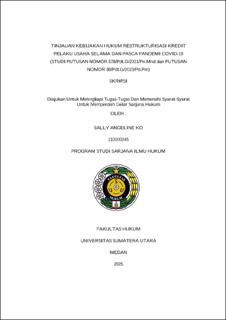| dc.contributor.advisor | Kaban, Maria | |
| dc.contributor.advisor | Harris, Abdul | |
| dc.contributor.author | Ko, Sally Angeline | |
| dc.date.accessioned | 2025-07-31T04:45:48Z | |
| dc.date.available | 2025-07-31T04:45:48Z | |
| dc.date.issued | 2025 | |
| dc.identifier.uri | https://repositori.usu.ac.id/handle/123456789/107927 | |
| dc.description.abstract | The credit restructuring regulation during the COVID-19 pandemic was a policy provided to debtors affected by the pandemic through Financial Services Authority Regulation (POJK) No. 11/POJK.03/2020 and its extension No. 17/POJK.03/2021.
This study aims to examine: (1) how credit is distributed and regulated within Indonesia’s banking system; (2) how the regulation of banking credit restructuring for business actors developed during and after the COVID-19 pandemic; and (3) how judicial considerations were reflected in Decision No. 578/Pdt.G/2021/PN Mnd and Decision No. 30/Pdt.G/2023/PN Pin.
This research uses normative legal methods with a statute approach and a case approach. Data were collected through literature studies and analyzed qualitatively.
Credit regulation in Indonesia refers to the Banking Law No. 10 of 1998. Although credit agreements are not explicitly regulated in the Indonesian Civil Code (KUHPerdata), they are categorized under loan agreements as regulated in Book III of the KUHPerdata. Credit distribution must comply with the principles of freedom of contract, good faith, and consensualism as outlined in Articles 1338 and 1320 of the KUHPerdata, and must fulfill the validity requirements of agreements in accordance with Article 1320 of the KUHPerdata.
Credit restructuring regulations during the pandemic were stipulated in POJK No. 11/2020, providing relief to debtors through credit rescue mechanisms. Debtors could not be deemed in default (wanprestasi) due to force majeure as regulated in Article 1245 of the KUHPerdata.
The review of the two court decisions shows that judges applied different legal considerations during and after the pandemic. The decision during the pandemic declared the creditor to have committed an unlawful act (Perbuatan Melawan Hukum), while the post-pandemic ruling stated that the debtor had committed a breach of contract (wanprestasi).
This research concludes that the divergence in judicial decisions stems from the differences in the credit restructuring policies enforced during the pandemic, which granted debtors the right to restructuring. After the pandemic, such policies were no longer in effect, and credit assessments returned to the creditor’s discretion. Failure of the debtor to fulfill contractual obligations constitutes a breach of contract. | en_US |
| dc.language.iso | id | en_US |
| dc.publisher | Universitas Sumatera Utara | en_US |
| dc.subject | Credit Restructuring | en_US |
| dc.subject | COVID-19 Pandemic | en_US |
| dc.subject | Judicial Consideration | en_US |
| dc.subject | POJK No. 11/2020 | en_US |
| dc.subject | Indonesian Civil Code | en_US |
| dc.title | Tijauan Kebijakan Hukum Restrukturisasi Kredit Pelaku Usaha Selama dan Pasca Pandemi Covid-19 (Studi Putusan Nomor 578/Pdt.G/2021/Pn.Mnd dan Putusan Nomor 30/Pdt.G/2023/Pn.Pin) | en_US |
| dc.type | Thesis | en_US |
| dc.identifier.nim | NIM21020045 | |
| dc.identifier.nidn | NIDN0025126010 | |
| dc.identifier.nidn | NIDN0111086001 | |
| dc.identifier.kodeprodi | KODEPRODI74201#Ilmu Hukum | |
| dc.description.pages | 115 Pages | en_US |
| dc.description.type | Skripsi Sarjana | en_US |
| dc.subject.sdgs | SDGs 16. Peace, Justice And Strong Institutions | en_US |


